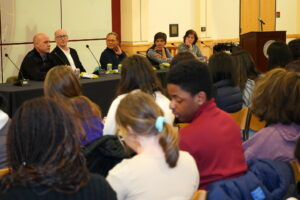 Welcoming experts in public health, two Milton Academy faculty members recently convened a forum to examine challenges created by the COVID-19 pandemic and the importance of supporting mental health—particularly among young people in our communities.
Welcoming experts in public health, two Milton Academy faculty members recently convened a forum to examine challenges created by the COVID-19 pandemic and the importance of supporting mental health—particularly among young people in our communities.
The Feb. 6 panel discussion, hosted by Boston College High School, was the latest event in the Humanities Workshop series. A collaborative initiative connecting public, private, and charter schools, each biennial program explores a single social justice issue through the lens of the humanities—the academic disciplines including arts, literature, languages, history, society, and culture. Created in 2018 by Milton faculty members Lisa Baker and Alisa Braithwaite, the initiative currently involves hundreds of students and faculty across eight area high schools.
The goal of the Humanities Workshop is to show students how key themes prominent in humanities studies—in particular, the importance of empathy and compassion—can be instrumental in working to solve the world’s complex problems.
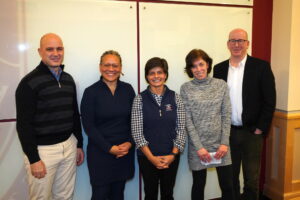 Event moderator and Boston Globe public health reporter Kay Lazar kicked off the discussion noting that the COVID-19 pandemic underscored critical factors related to public health, noting the virus’ spread “highlighted a lot of issues” including existing disparities of income, race, ethnicity, and geography. Lazar asked the panelists to pick one of the most challenging issues to come out of the pandemic and suggest fresh approaches that could be used to help resolve it.
Event moderator and Boston Globe public health reporter Kay Lazar kicked off the discussion noting that the COVID-19 pandemic underscored critical factors related to public health, noting the virus’ spread “highlighted a lot of issues” including existing disparities of income, race, ethnicity, and geography. Lazar asked the panelists to pick one of the most challenging issues to come out of the pandemic and suggest fresh approaches that could be used to help resolve it.
A key focus of the event’s discussion centered around the mental health challenges the COVID-19 pandemic exacerbated, and how young people could and should use empathy and compassion to keep an eye on how their peers are doing and help direct them toward support if needed.
Dr. Reena Pande, former chief medical officer of AbleTo, an organization specializing in the delivery of virtual mental health services, said that the pandemic created strong feelings of “loneliness” throughout communities and revealed how much people depend on and need each other. “When the pandemic hit, we all suddenly were disconnected…I think that was the most impactful challenge that was brought to bear.”
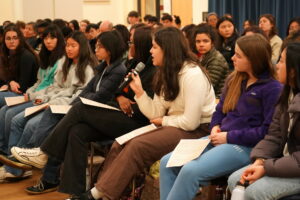 Those feelings of isolation made the day-to-day experience difficult for so many, especially for young people. Dr. Giuseppe Raviola, a physician, child and adolescent psychiatry specialist, therapist, and teacher, explained that supporting mental health is a responsibility that can be shared collectively. “There are many ways to think about formalizing informal support. I think it’s really exciting to think about how young people—high school students—can basically do it themselves.” Raviola said embedding simple support approaches—such as “Psychological First Aid,” an initial response intervention with the goal to promote safety, stabilize survivors of disasters and connect individuals to help and resources—“teaches you how to look and identify people under stress, how to listen to them empathically, and how to link them to support.” Raviola has committed to instructing Humanities Workshop consortium students on practicing Psychological First Aid this year.
Those feelings of isolation made the day-to-day experience difficult for so many, especially for young people. Dr. Giuseppe Raviola, a physician, child and adolescent psychiatry specialist, therapist, and teacher, explained that supporting mental health is a responsibility that can be shared collectively. “There are many ways to think about formalizing informal support. I think it’s really exciting to think about how young people—high school students—can basically do it themselves.” Raviola said embedding simple support approaches—such as “Psychological First Aid,” an initial response intervention with the goal to promote safety, stabilize survivors of disasters and connect individuals to help and resources—“teaches you how to look and identify people under stress, how to listen to them empathically, and how to link them to support.” Raviola has committed to instructing Humanities Workshop consortium students on practicing Psychological First Aid this year.
Dr. Michael Stein, a physician, health policy researcher, and public health thought leader, concurred that students need to know how to identify someone under stress and help each other—a critical skill at this time in their lives. For young people, he said, “untreated mental health problems…lead to between two and three times the probability of you dropping out” of high school or college. Stein said it’s very important for young people to “understand what it looks like when your friends and the people you don’t know so well are distressed—because peers turn to peers before they come to us. And you all have to be able to read those clues when a person withdraws or when a person seems hopeless,” he said. “Recognizing and knowing where to send them is a key element for part of these years for you.”
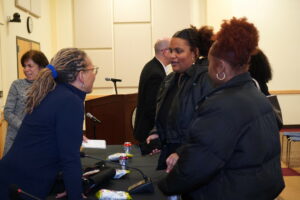 Dr. Kathryn Hall, Boston Public Health Commission’s deputy commissioner for population health and health equity, told the largely student audience that the discussion’s subject matter will always be relevant and interconnected within each of our lives, no matter where we live or the work that we do. “There is no field that does not touch public health,” she said.
Dr. Kathryn Hall, Boston Public Health Commission’s deputy commissioner for population health and health equity, told the largely student audience that the discussion’s subject matter will always be relevant and interconnected within each of our lives, no matter where we live or the work that we do. “There is no field that does not touch public health,” she said.
Hall also noted she was optimistic over the way people helped one another during the pandemic, revealing that our communities have a connected, supportive spirit. “We can come together in the face of adversity,” she said. “Together we are much stronger. Coming together over a common cause to safeguard public health and humanity—to me, it’s very exciting and heartwarming and a good omen for the future.”
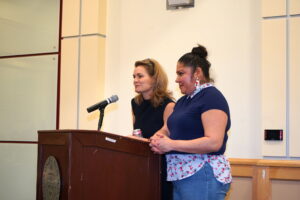 Standing alongside fellow Milton Academy faculty member and Humanities Workshop co-director Melissa Figueroa, workshop co-founder Lisa Baker spoke in appreciation of the nearly 100 students, teachers, and community members from the Humanities Workshop’s area schools for attending the event. “We want to thank teachers, who, from the beginning, have believed in this effort to work across and join together as school communities to look at these social issues. To our students, we are so grateful for your taking a risk of engagement, of learning in this way,” Baker said.
Standing alongside fellow Milton Academy faculty member and Humanities Workshop co-director Melissa Figueroa, workshop co-founder Lisa Baker spoke in appreciation of the nearly 100 students, teachers, and community members from the Humanities Workshop’s area schools for attending the event. “We want to thank teachers, who, from the beginning, have believed in this effort to work across and join together as school communities to look at these social issues. To our students, we are so grateful for your taking a risk of engagement, of learning in this way,” Baker said.
Video of the Feb. 6 event is available on Milton Academy’s Vimeo channel. This year’s workshop programming will conclude with a conference-style event at the Edward M. Kennedy Institute in May, where consortium students will share and discuss their public health project work.
The Humanities Workshop’s 2022-2023 consortium schools include the Academy of the Pacific Rim, Boston College High School, Boston Collegiate Charter School, Boston International Newcomers Academy, Boston Latin School, John D. O’Bryant School of Math and Science, Milton Academy, and Phillips Academy Andover. More information is available on the workshop’s website.